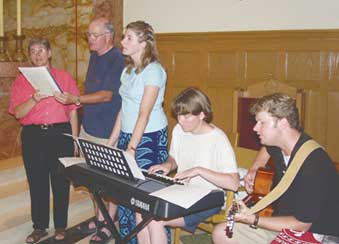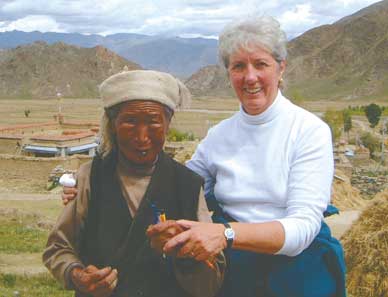Serving the reign of God
Scarboro Missions' priorities for mission today as agreed upon in the XIth General Chapter, 2002
By Fr. Gerald Curry, S.F.M.
January/February 2003
Return to Table of Contents
Print Article
St. Paul in his first letter to the Thessalonians, wrote about his way of being present as a missionary among the people of Thessalonica, a city in Greece: "We were gentle among you as a nursing mother cares for her children...determined to share with you not only the Gospel of God but our very selves...For this reason we give thanks...that you received the word of God, which is now at work in you who believe." (1 Thessalonians 2:7-13)
Scarboro missioners have always been concerned with the way we live out our missionary presence among others. Our General Assembly and Chapter meetings in August 2002 were an expression of this concern. We started our preparations for these meetings two years prior by reading and studying what we were called to be as missioners in a world of change. More than 60 of us prayed and shared about what we see as central to being a missioner today. We recognized that we pursue our Society vision in a time when the theory and practice of mission are undergoing a profound shift.
Signs of the times
Vatican II used the phrase, "signs of the times," to describe the modern world. We need to be aware of the realities of our time. We see around us signs of God's presence: love and caring, compassion and forgiveness, the pursuit of freedom, justice, and peace. We see, as well, poverty and oppression, violence and war, the abuse of power and other realities that deny the presence of a loving God in our world.
The reign of God
In the Gospel of Matthew we read that Jesus "went around the whole of Galilee teaching in their synagogues, proclaiming the Good News of the reign" (Matthew 4:23). Luke's Gospel tells us that Jesus urged his disciples "to set their hearts on the reign" (Luke 12:38).
(Pope John Paul II): "Jesus of Nazareth brings God's plan to fulfillment. After receiving the Holy Spirit at his baptism, Jesus makes clear his messianic calling: he goes about Galilee preaching the Gospel of God and saying 'the time is fulfilled and the reign of God is at hand; repent and believe in the Gospel' (Mark 1:14-15; Matthew 4:17; Luke 4:43). The proclamation and establishment of God's reign are the purpose of his mission: 'I was sent for this purpose' (Luke 4:43)."
Scarboro missioners understand mission as service and witness to the reign of God, to a world of justice, peace, and love. This is the task to which we commit ourselves. This is what we do as missionaries. The Church and we its members are called to be servants and witnesses to the reign of God as proclaimed by Jesus.
A community of priests and laity
Founded in 1918, Scarboro Missions began as a community of priests dedicated to serve in China. After WWII we began to serve in other mission areas and in 1974 we invited the laity to serve in mission with us. Today we are a community of priests and laity, which reflects our vision of Church.

We are present in Asia, Africa, Latin America, the Caribbean, and in Canada. Although we serve primarily overseas, mission today cannot be adequately defined simply in geographical terms. Mission today is everywhere, overseas and in Canada. People on the margins and those who know little or nothing of the Good News can be found anywhere in our world. Europe and North America, regions long described as "Christian," are largely secular and are home to peoples of many faith traditions. Latin America, Asia, and Africa, once characterized as "mission regions," now have vibrant and growing churches and are home to the majority of the world's Catholics.
However, our Society priorities are rooted in the understanding that cross-cultural, overseas mission service is essential to who we are as a mission community. All members must serve at least one term overseas in a culture other than our own.
Our overseas experience changes us in surprising and unexpected ways. The poor help us to understand life as they experience it. Other cultures teach us new ways of understanding and experiencing God. By walking with peoples in other lands, we discover that the Holy Spirit is already present among them.
Only after service overseas do we return to Canada to share our experience-what we have "seen and heard"- with the Canadian Church, and so help Canadians in their faith journey.
Scarboro Missions is being challenged to continue to try to be a different model of Church, and we commit ourselves as a Society to focus our energies and resources in five principal areas.
1) Human development
For us, human development includes basic human needs such as bodily nourishment and health, as well as a decent place to live and to raise a family. It also includes the need for love and security, education, the need of the human spirit for freedom and, above all, to seek the purpose and meaning of life. The development of the whole person can only take place in a world where justice and peace flourish and where there is respect for every human person and for all of creation.
(Pope John Paul II): "Evangelization and integral human development-the development of every person and of the whole person-are intimately linked...This connection between evangelization and human development explains the Church's presence in the social sphere, in the arena of public and social life. Following the example of her Lord, she exercises her prophetic role on behalf of all people, especially the poor, the suffering, the defenseless."
Scarboro Missions will continue to serve the poor and those on the margins of society, people whose dignity and rights are denied. We live among them, helping them to deal with the impact of injustice in their lives. We live in solidarity with them, joining in their cause, attempting to change unjust structures that deny their dignity as children of God. Everywhere we can, we join with others in the struggle for global justice and human rights.
Solidarity with the cause of the poor led us to establish a Justice and Peace Office (JPO) in 1980. This office has been involved in working for a more just Canada and a more just world. We make known to Canadians concrete situations of injustice and denial of human rights that we see and hear among the poor whom we serve. Our JPO website will be a meeting place for those involved with justice and peace issues, where they can share their experience and learn from each other.
We will continue to work with other Christians and those of other faiths in bringing to fruition God's reign in our world.
2) Dialogue
We commit ourselves to dialogue with other faiths in order to understand them and respect them. We believe that God is present in the great religions of our world. We approach them with a humble spirit and enter into earnest dialogue that always transforms both parties. "Other religions constitute a positive challenge for the Church. They stimulate her to both discover and acknowledge the signs of Christ's presence and the workings of the Spirit, as well as to examine more deeply her own identity." (John Paul II, Redemptorist Missio, 56)
Because we come face to face with people of other faiths here in Canada and everywhere we go, our training program for our new missioners emphasizes this service of dialogue with all its complexities and with the need for sensitivity and respect.
(Pope John Paul II): "The main road of mission is sincere dialogue. Dialogue does not originate from tactical concerns of self-interest, nor is it an end in itself. Dialogue, instead speaks to others with respect and understanding, stating the principles in which we believe and proclaiming with love the most profound truths of the faith which are joy, hope, and meaning of life. In fact, dialogue is the realization of a spiritual impulse leading to inner purification and conversion, which, if pursued with docility to the Holy Spirit, will be spiritually fruitful. Commitment for attentive and respectful dialogue is a condition sine qua non for authentic witness of God's saving love."
3) Our spirituality
Motivated by the Spirit, we dedicate ourselves to the person, teaching and mission of Jesus Christ who said, "I have come that they may have life and have it to the full." (John 10:10)

As a Scarboro community we have always had a strong sense of hospitality, welcoming others and sharing what we have. We have tried to be inclusive of 'the other,' especially those who suffer because of a perceived difference. We try to listen to and respect each other. We try to be with the poor and share in their life and their cause, to walk with them, respecting their dignity as God's children. We try to be open to change and mindful of our own vulnerability. We try to be guided by the Gospel and to rely on God's grace. (See our Mission Statement on page 5.)
4) Membership
We will put a lot of effort into making Canadian Catholics aware of us, our work and programs, and our understanding of mission. We will invite them to join us as priests and lay members. We will attempt to do this through personal contact, through our magazine and website, and through our Mission Information Department which receives and sends most of our communication with you our partners in mission. We will take every opportunity to use the media and the facilities of our Mission Centre in Toronto.
In a special way, we want to share our experience of being a community of priests and lay people. We have had our struggles in living and working together. Yet, this past summer's meetings were a good experience for us. We grew closer and we have started a process towards a new partnership between priests and laity, with a form of government that will express our common life and goals, and maximize the ways we can work together. Those who join us will be well prepared for mission work and given the best possible support to carry out their missionary vocation.
5) Sharing the rich diversity of Christian faith
We believe that the Church is a sign of unity for humankind when it actively shares and celebrates its rich human and Christian diversity. To make concrete this universal Christian experience, we will facilitate the exchange of experience, gifts, and insights of Christians in other parts of the world with Canadian Christians. As well, we will facilitate exchanges among Christians with different expressions of Christianity and we will work towards Christian unity.
These are some of the areas and priorities with which we challenge ourselves as we continue our journey of faith as contemporary missioners. It is our hope that, like St. Paul, we will be able to give thanks because we have proclaimed not a human word, but a Divine word at work in those who believe. We thank our benefactors and friends for their prayers and financial support through which we are able to continue our work of mission. And we invite other Canadians to accept this challenge and join us in serving and witnessing to the reign of God in our world.
Return to Table of Contents
Print Article